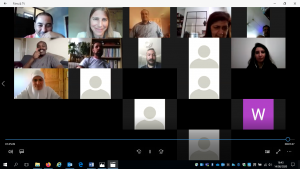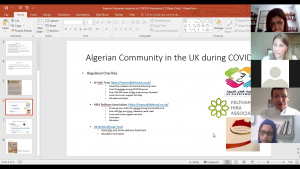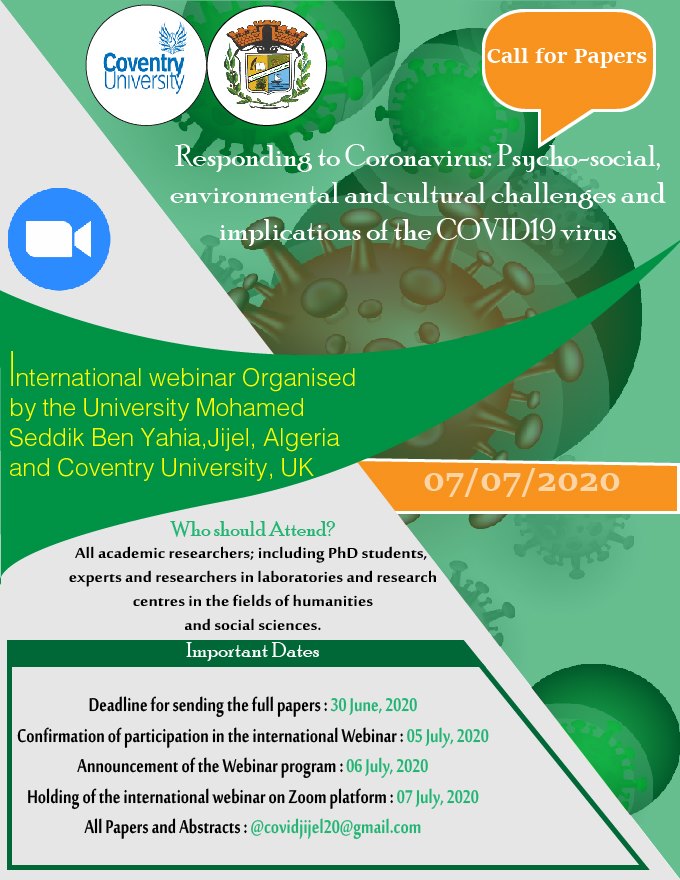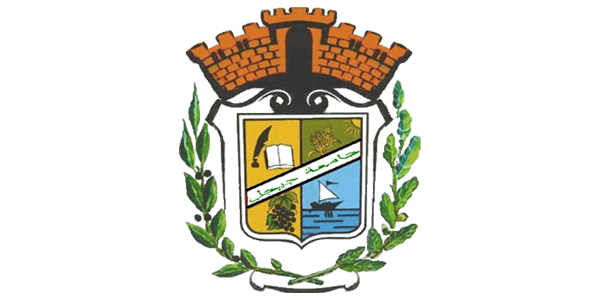
The Coronavirus global crisis has particularly affected both Algeria and the UK. By summer 2020, over forty thousand deaths have been recorded in the UK, and almost one thousand deaths in Algeria, but with numbers steadily rising.
How can we respond to this tragedy? What are the wider impacts on our societies, economies and environments? What is the impact on young people and vulnerable groups of this public health crisis? What solutions have other countries found and how can we learn from these?
These were just some of the questions our research network discussed during an international, online conference this July. Launched by the Rector of Jijel University, Professor Hamza Amireche, the conference united scholars from universities across Algeria, the UK, Ireland and Iraq. Four panels analysed the different responses and implications of the pandemic. Exploring questions of governance, solidarity, education, family and social structures, the online conference reunited members of the research network and welcomed new colleagues, confirming our ability to work effectively across borders, using online technology.

International space for debate
Reflecting on the outcomes of sessions, lead investigator of the Youth Futures programme, Professor Said Chawki Chakour indicated the importance of such international spaces for debate, stressing that these must feed into policy and long-term, strategic approaches to dealing with pandemics.
With no guarantee that current vaccine trials will be successful, globally we need to rethink our ways of working, communicating and living. With the ongoing nature of the crisis and the long-lasting effects, consistent communication with local populations is vital.
Professor Said Chawki CHAKOUR
Professor Chakour further emphasized the need for universities to play an active role in supporting public health sectors:
“In Jijel, the University, alongside the Wilaya, was one of the first to respond to the crisis, offering our skills and facilities to provide spaces for those in need of care or quarantine.”
The rise in solidarity from grassroots organisations in a number of the different countries was one of the more positive outcomes analysed by the speakers in a number of joint contributions. Enhanced use of technology in education and the work place was another. Participants reflected on how to sustain such effects, in the face of devastation faced by vulnerable communities in particular. Inequalities in access to technology and to education, and the difficulty of engaging pupils over time and risks of gaps in education were highlighted as major challenges. Speakers flagged the importance of modern, empowered and effective institutions, rather than regime types, as a factor of successful public health responses.

Influencing policy and action
The conference was reported in the Algerian press and locally in the UK by Coventry University media team. With support from the regional Wilaya in Jijel and University authorities in Jijel and Coventry, the team are optimistic about the potential, through such initiatives, to strengthen the role of our research network. The #YouthFutures DZ research programme aims for influence in terms of public policy and also practical action to support our communities.
Conference speakers will submit their papers to a special edition of the Algerian Social Sciences Journal edited by the Youth Futures investigator Dr Adel Chiheb. Keep following our blog posts and social media for further information on this in the coming months.




